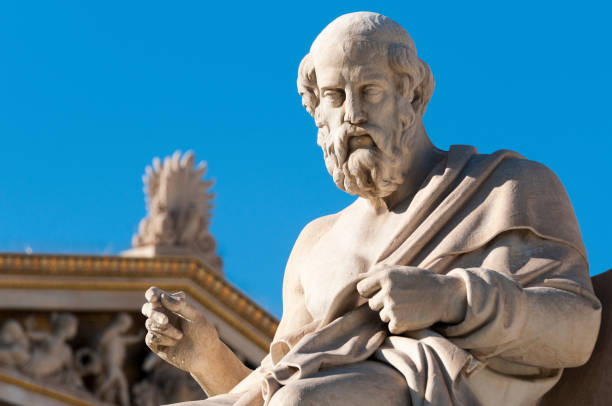The Jewish Mind vs Greek Philosophy
In part 1 and part 2 of this series we looked at three textual considerations having to do with grammar and the translators’ bias in the prologue to John’s gospel. First, we saw that “Word” (logos) was incorrectly capitalized, inferring that it was a person that pre-existed with God. Second, we learned that the translators failed to follow standard translation methods when they referred to “word” (logos) as a “he” and “him” instead of an “it” which the English calls for as evidenced by more than fifty Bible translations. The omission served to further emphasize their bias that “word” was the pre-existing Jesus. Third, the translators failed to treat the second “God” in verse 1 as a descriptive noun when they said the “Word was God” instead of the more accurate “the word was God-like” or “what the word was, God was.” Their biased translation gives the reader the impression that the “word” (logos) is God Himself.
In this, the final installment in this series, we’ll look at how the introduction of philosophical ideas into Christian teaching paved the way for interpreting John 1 as proof that Jesus pre-existed in heaven as the Word of God.
Plato’s Influence on the Church Fathers
Many of the Church Fathers were originally pagan philosophers who followed the teachings of Plato and others. When they converted to Christianity, instead of renewing their minds (as Paul instructed the Christian converts in Rome to do[1]), they synthesized their Platonic-inspired worldview with that of Christianity. James Strong, Bible Scholar and author of the famous Strong’s Concordance, writes:
Towards the end of the 1st century, and during the 2nd, many learned men came over both from Judaism and paganism to Christianity. These brought with them into the Christian schools of theology their Platonic ideas and phraseology.[2]
Although the Church Fathers professed to have laid their pagan views aside when they converted to Christianity, their theology reveals that Greek philosophy still permeated their thinking. Philip Schaff, theologian and Church historian agrees:
…many of the early Christians, in turn, found peculiar attractions in the doctrines of Plato, and employed them as weapons for the defense and extension of Christianity, or cast the truths of Christianity in a Platonic mold. The doctrines of the Logos and the Trinity received their shape from Greek Fathers, who were much influenced, directly or indirectly, by the Platonic philosophy, particularly in its Jewish-Alexandrian form. That errors and corruptions crept into the Church from this source cannot be denied.[3]
What were the errors and corruptions that crept into the Church and influenced our understanding of God and His logos? In this post we’ll look at some of the views of philosophers Plato, Philo and Justin Martyr and how they influenced our interpretation of John’s prologue.
Plato’s doctrine of the immortal soul
Plato (c.428-347 B.C.), a philosopher from Athens, is credited as being one of the most influential figures in the history of Western thought. He is best known for his dualistic worldview in which he imagined a higher world of the “Forms” or “Ideas” and a lower world of matter. As a student of the famous philosopher, Socrates, Plato believed that all souls literally pre-existed in heaven before coming down, incarnated on the earth.[4] It was this belief in the eternality of souls that would make it possible for future generations to embrace the concept of Jesus’ pre-existence before being incarnated in Mary’s womb. But this idea is foreign to the traditional Hebrew thought found in the Bible where all things first “existed” with God in His plan or foreknowledge, but not in a literal sense. For example, instead of literally pre-existing in heaven before we are born, Scripture teaches that we are foreknown by God and a part of His plan.
Psalm 139:15-16 (NASB) My frame was not hidden from You, when I was made in secret, And skillfully wrought in the depths of the earth; 16 Your eyes have seen my unformed substance; And in Your book were all written the days that were ordained for me, when as yet there was not one of them. (emphasis added)
1 Peter 1:1-2 (NASB) Peter, an apostle of Jesus Christ, To those who reside as aliens, scattered throughout Pontus, Galatia, Cappadocia, Asia, and Bithynia, who are chosen 2 according to the foreknowledge of God the Father, by the sanctifying work of the Spirit, to obey Jesus Christ and be sprinkled with His blood: May grace and peace be yours in the fullest measure. (emphasis added)
Another way to articulate the Scriptural view of things pre-existing in God’s mind or foreknowledge is to say that they existed before “the foundation of the world.” They didn’t literally exist or transpire before the world was created, but in God’s mind or plan, they were established:
Ephesians 1:3-4 (NASB) Blessed be the God and Father of our Lord Jesus Christ, who has blessed us with every spiritual blessing in the heavenly places in Christ, 4 just as He chose us in Him before the foundation of the world, that we would be holy and blameless before Him. (emphasis added)
Revelation 13:8 (KJV) And all that dwell upon the earth shall worship him, whose names are not written in the book of life of the Lamb slain from the foundation of the world. (emphasis added)
Jesus, the Lamb of God, wasn’t literally slain before the world was created, but in God’s mind, in His great plan, it was predetermined to occur. This classical Hebraic view of pre-existence is how Scripture speaks of Jesus. He did not literally exist in heaven before the world began, as Plato’s followers would have understood it, rather, he was foreknown by God and a part of His pre-determined plan.
Acts 2:22-23 (NASB) “Men of Israel, listen to these words: Jesus the Nazarene, a man attested to you by God with miracles and wonders and signs which God performed through Him in your midst, just as you yourselves know— 23 this Man, delivered over by the predetermined plan and foreknowledge of God, you nailed to a cross by the hands of godless men and put Him to death. (emphasis added)
1 Peter 1:20 (NASB) For He [Jesus] was foreknown before the foundation of the world, but has appeared in these last times for the sake of you… (emphasis added)
In this passage, the apostle Peter could have written, and certainly would have if it were true, that Jesus pre-existed in heaven as God-the-Word. But neither he, nor any of the NT writers state this. Instead the text plainly says God foreknew Jesus, something that was also said of the prophet Jeremiah:
Jeremiah 1:5 (NASB) “Before I formed you in the womb I knew you, And before you were born I consecrated you; I have appointed you a prophet to the nations.” (emphasis added)
Plato viewed the “Logos” as part of the divine triad
In addition to the idea that all souls pre-exist before they exist, another concept that influenced the Church Fathers’ eventual understanding of John 1 is Plato’s view of the divine triad. Greek philosopher Heraclitus (600 BC) is said to have been the first to apply the word “logos” to what he considered to be divine reason which he surmised coordinated the universe. The “logos” was not a person in Heraclitus’ view, but rather wisdom, a kind of power or influence. Plato furthered the idea by teaching that the “logos” was a part of the divine triad: The Good, Ideas (Logos), and the World-Spirit.[5] He did not think that Logos (wisdom, reason, etc.) was a literal person, but rather a governing principle or force. This divine triad would later give rise to the idea of a triune God.
Philo of Alexandria
Philo of Alexandria (c. 20 BC – 50 AD) was a first century philosopher who was said to be Jewish by birth but Greek in thought. Instead of reading Scripture at face value, Philo used philosophical allegory in an attempt to harmonize the Torah with Greek philosophy;[6] for this he is well known.
Philo believed that God was impersonal, and that He created and governed the world through mediators. The Logos, although not a person, was the chief or highest mediator[7], a kind of “first born of God.”[8] Logos was neither uncreated as God is or created as man is, rather Logos occupies the middle ground and has no power of its own[9]. Logos was both the agent of creation and the agent through which the human mind can comprehend God.[10] In other words, we come to know God through Wisdom or Logos.
Philo’s synthesized view of Scripture and philosophy strongly influenced the Church Fathers. When they read John’s prologue through the filter of Philo’s teachings, their Platonic background affirmed the first century philosopher’s views, thereby overpowering the traditional Hebraic meaning of John’s words. It is no wonder that the Jews soundly rejected him. Church historian, Kegan Chandler, writes in his book, The God of Jesus in Light of Christian Dogma:
It was for [Philo’s] radically non-traditional views, and for his insistence upon the brilliance of his own Platonic reinterpretation of the Bible, that the mainstream Jewish community rejected him. Indeed Philo’s works may not have been preserved at all had it not been for the Gentile Church Fathers’ infatuation with them.[11]
In addition, The Jewish Encyclopedia says:
Philo included in his philosophy both Greek wisdom and Hebrew religion, which he sought to fuse and harmonize by means of the art of allegory that he had learned from the Stoics. His work was not accepted by contemporary Judaism.… Philo was all the more enthusiastically received by the early Christians, some of whom saw in him a Christian… The Church Fathers have preserved most of Philo’s works that are now extant.[12]
Justin Martyr
The Christian Justin Martyr (c.100-c.165), a Platonist by training, was among the first to argue that Christianity could draw on both the scriptures and Greek philosophy and could even appropriate philosophy for its own ends. “Whatever good they [the philosophers] taught belongs to us Christians.” He was echoed by Clement of Alexandria (c.150-c.215), who claimed that God had given philosophy to the Greeks as a “school-master” until the coming of the Lord as “a preparation which paved the way towards perfection in Christ.[14]
Justin further theorized that God created the Logos, and the Logos in turn, created the world, an idea that was adopted by many of the Church Fathers. The Logos or the pre-existent Jesus, was also “god” (as were the angels) but was subordinate to God the Father. Justin’s theory came to be known as “Logos Christology” and it greatly influenced Church doctrine. Its important to note, however, that Justin admitted that he could not prove Jesus pre-existed when he wrote:
Jesus may still be the Christ of God, though I should not be able to prove his pre-existence as the Son of God who made all things.[15]
An unproven theory is still just a theory. Nevertheless, over time, the Church Fathers came to accept Justin’s theory as fact. The result being that today the fourth gospel is seldom if ever read without the filter of his Logos Christology.
Conclusion
While Justin was unable to prove his confidently postulated arguments, what is demonstrable is the role Greek philosophy played in the establishment of post-Biblical doctrines such as Jesus’ literal pre-existence and ultimately the Trinity. But should we, as Christians, reject the “wisdom” proposed by these great philosophical minds? Is it possible that their teachings clarified or enhanced Biblical truths in some way? Some may be comfortable in endorsing a hybridized Christology, however, such syncretism is a far cry from the teachings of the early Church.
Colossians 2:8 (NASB) See to it that no one takes you captive through philosophy and empty deception, according to the tradition of men, according to the elementary principles of the world, rather than according to Christ. (emphasis added)
Matthew 15:9 (NASB) ‘But in vain do they worship Me, teaching as doctrines the precepts of men.'” (emphasis added)
While some are unwilling to admit the role Greek philosophy played in the development of Church doctrine, thankfully, there are numerous Biblical scholars who will attest to the fact that the Church Fathers interpreted John’s prologue through a Platonic prism. The Oxford Companion to the Bible speaks to this point:
“In Hellenistic Christianity, a new pattern began to develop in which Christ existed in heaven before His birth. Here is a Christology of preexistence and incarnation. It is generally agreed that this pattern developed from the identification of Jesus with the wisdom of God. In Judaism, especially in the Greek-speaking world, the notion of the wisdom of God had undergone a remarkable development. Originally, it had been no more than the personification of a divine attribute… In later wisdom literature, however, and in the writings of Philo, the concept of the wisdom or Word (logos) of God…it became the distinct personal entity within the being of God, something like a person in the sense in which the term was later used in the Christian dogma of the Trinity… [Jesus] came to be regarded not merely as a spokesperson of wisdom but as wisdom’s final envoy who acted as the mouthpiece of wisdom… From there, it was but a short step to identify him in person with wisdom itself…“[16] (emphasis added)
Despite fierce opposition, this altered view of John’s prologue prevailed through two of the most contentious and pivotal Church councils (Nicaea and Constantinople). In the end, Emperor Theodosius made it illegal to dispute Jesus’ deity. Chandler writes:
Thus all Human Christologies and all unitarian views of God were now illegal and the suddenly blossoming Trinitarian, that is, Cappadocian, interpretation of the Nicene faith was to be accepted on pain of death.[17]
Thankfully, those who oppose the Hellenization of John’s prologue are no longer under the threat of death. A growing number of Christians are willing to investigate the historical development of Jesus’ supposed pre-existence and subsequently, the doctrine of the Trinity. It is time to expose the translators’ biased interpretation of John 1:1 and restore the apostle’s original intent to one of the most famous Christological passages of all: In the beginning was the word…
[1] Romans 12:2
[2] James Strong, John McClintock, “Trinity” in Cyclopaedia of Biblical, Theological, and Ecclesiastical Literature, Vol. 10, (New York: Harper, 1891), p. 553.)
[3] Philip Schaff “Platonism and Christianity” in The New Schaff-Herzog Encyclopedia of Religious Knowledge, Vol 3, p. 1853.
[4] Plato, Timaeus
[5] Charles Bigg, Christian Platonists of Alexandria, 1886, p. 249
[6] “Philo,” Wikipedia, accessed 04-27-19, https://en.wikipedia.org/wiki/Philo
[7] “Philo’s View of God,” Wikipedia, accessed 04-27-19, https://en.wikipedia.org/wiki/Philo%27s_view_of_God#cite_note-hpPhilo-14
[8] Frederick Copleston, A History of Philosophy, Volume 1, (Continuum, 2003) p. 458-462.
[9] “Philo,” Wikipedia, accessed 04-27-19, https://en.wikipedia.org/wiki/Philo
[10] “Logos,” Encyclopaedia Britannica, accessed 04-28-19, https://www.britannica.com/topic/logos
[11] Kegan A. Chandler, The God of Jesus in Light of Christian Dogma, (McDonough, GA: Restoration Fellowship, 2016), p. 72.
[12] C. H. Toy, C. Siegfried, J. Z. Lauterbach, “Philo Judaeus,” Jewish Encyclopedia, 1906.
[13] Chandler, p. 77
[14] Charles Freeman, The Closing of the Western Mind, (New York, NY: Vintage Books, 2002) pp. 142-143.
[15] Juan Baixeras, “A Patristic Study of the Kingdom of God and the Development of the Trinity,” accessed 4-24-19; http://www.biblecenter.de/bibliothek/baixeras/apatrist5.html
[16] “Jesus Christ,” The Oxford Companion to the Bible, Bruce M. Metzger, Michael David Coogan, ed. (New York: Oxford University Press, 1993), p. 362.
[17] Chandler, p. 219




Brilliant article. Really insightful. Thanks. The legacy of Greek thinking has certainly affected the development of Christianity. The challenge will be to unravel the package to present something devoid of Greek spirituality. I am beginning to see the damage unwittingly brought into Jesus’ kingdom message and hope to pick the brains of those who have already uncovered the faults. Currently wonder what the Greek idea of ‘guiding spirits’ has to do with the continuing Christian belief in demons, evil spirits, and a personalized devil.
Thanks, Jamie, for reading the article and for your encouragement. I’m glad you found the information helpful and appreciate you commenting.
Blessings,
OGW
Sometimes it is more useful to admit to the things that we don’t know rather than to profess a dogma that is subject to question. Some might call this a cornerstone of humility. I think the premise of this article misses the mark in that regard. For example, it specifies many scriptural passages that, depending on the context, may be said to advance a unitarian theology, while discounting others, e.g., : “Truly I say to you, before Abraham was, I AM.” John 8:58. This is but one of others: Isaiah 9:6; Colossians 1:17; Revelation 1:17; Hebrews 7:3, etc. We could delve much more deeply into this is the mind is truly open, including through sources such as modern science and information technology suggesting a transcendent Wisdom, or “Word”, underlying all of material existence. The Gospel of John identifies this Wisdom, this “Word”, with God Himself. To say that this “Word” is merely a “word”, without sentience, transcendence, much less Wisdom, may be deeply disturbing to some if thought about in this context.
Thanks Austin, for sharing your thoughts. Please note, that I have not discounted passages such as John 8:58, Isaiah 9:6, Colossians 1:17, etc. If you will look under the “Common Verses” tab you will see links to these and other supposed Trinitarian proof texts. As you can imagine, it is not possible to address all of the Scriptural issues in one article. I encourage you to read through these and other articles.
Thanks again for reaching out.
Blessings,
OGW
As a professional translator myself, I appreciate this nuanced view. I have always felt uncomfortable with the idea of an incarnate god, and this article clarified my suspicion.
Thanks for reading and sharing your thoughts. Appreciate the feedback.
OGW
Wow! Thank you for your research and then sharing it.
You are welcome, Lori! I’m glad you found the information helpful. Thank you for taking the time to check out the website.
Blessings,
OGW
JUst found this website! truly a blessing
So glad to hear the site has blessed you! Thanks for letting me know!
About 3 decades believing in trinity and incarnation of Jesus, not being able to understand or comprehend at anytime what I believed because being told that’s the mystery only God knows and being in front line to defend my belief in triune God before others because that was the way how I have been instructed , informed and influenced by missionaries, pastors and teachers all time along. So I did to others proclaiming things beyond the scriptures with the others lenses not mine.
The mystery of God the Father was Christ which was hidden from the very beginning until the last days which God the Father of all creation have spoken through His Son, the Messiah Jesus of Nazareth.
Hebrew 1:1-2
In many parts, and many ways, God of old having spoken to the fathers in the prophets,
in these last days did speak to us in a Son, whom He appointed heir of all things, through whom also He did make the ages;
We need to search the scriptures and study them to find the real meaning, it doesn’t happen during a night , it takes time to bring down every high thing that exalts against the knowledge of God.
2 Corinthians 10:4-5
For the weapons of our warfare are not carnal, but mighty through God to the pulling down of strong holds;)
5 Casting down imaginations, and every high thing that exalteth itself against the knowledge of God, and bringing into captivity every thought to the obedience of Christ;
Glory and honor only to our Wise , Immortal, Invisible the Heavenly God the Father and to our Lord and Savior Jesus the Son of the Living God , the Messiah.
Amen! Thanks for sharing!